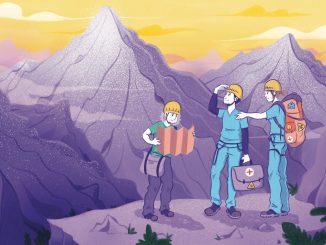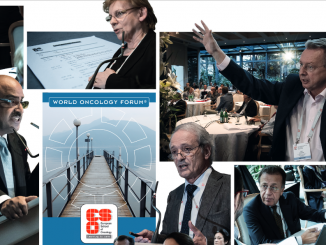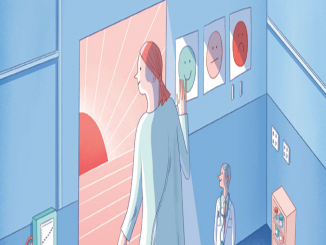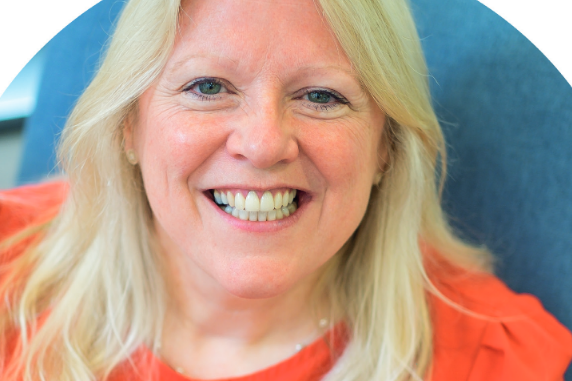
Nurses are not the only ones who care and can nurture, support and explain things to patients who are scared and vulnerable, says pioneering cancer nurse Shelley Dolan. But they are the only health professionals to have this as their key role, and she is calling for Europe to do everything possible to empower them.
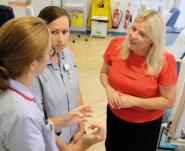 Looking at Shelley Dolan today – fresh face beaming enthusiastically as she talks about the untapped potential of her profession – it’s hard to believe that 25 years ago one of Britain’s most influential cancer nurses started her illustrious career as a punk rocker.
Looking at Shelley Dolan today – fresh face beaming enthusiastically as she talks about the untapped potential of her profession – it’s hard to believe that 25 years ago one of Britain’s most influential cancer nurses started her illustrious career as a punk rocker.
“I looked outrageous, and I was always in trouble with the senior nurses – constantly questioning whether a certain rule had to apply,” she says.
But those rebellious beginnings were far from inauspicious. Dolan’s youthful impatience with rules and assumptions have stood her in good stead as she has tried to widen understanding about the role of nursing in good cancer care – not just in the UK, but throughout Europe. Like her suffragette grandmother, she has refused to allow a cause she believes in to be strangled by the bonds of tradition. And far from alienating her, it has brought her to the top of her profession.
Dolan is today chief nurse at the Royal Marsden Foundation Trust – Britain’s best-known specialist cancer centre, affiliated to the Institute of Cancer Research, employing 4000 staff and based on three sites in and around London. She is also clinical director for the London Cancer Alliance, an integrated cancer system looking to improve cancer outcomes and experiences in the UK’s capital.
But it isn’t just in the UK she is held in high esteem. Last year she received the European Oncology Nursing Society Lifetime Achievement Award, not just for her work developing the UK’s largest critical care unit at the Royal Marsden, but for leading nurses to strive for better care around the world. She has advised and lectured on nursing in many countries: she developed the first clinical leadership course for cancer nurses in South Africa, and received the Serbian People’s Medal for Cancer Nursing in 2006 for her work on caring for patients in critical care.
“I want people to understand the power of nursing in cancer, and the need to liberate that power,” she says. “Nursing across Europe is a major workforce and if we nurture nurses, educate them in the science, the care, the influencing and leadership skills, we could make a massive step change for the experience of people with cancer and their families. Leaders in healthcare across Europe must do everything they can do to empower nurses.”
She is aware that, as a nurse leader in the UK, she speaks from a relatively privileged position. The UK’s clinical nurse specialists in cancer are graduate level nurses, normally prepared at Master’s level, who are clinical experts in evidence-based nursing practice within cancer or a specialty of it. Other countries such as the United States, Australia, Belgium, Ireland and the Netherlands also have advanced practice nurses, some of whom have prescribing rights.
Highly educated in the science of treatment, but also expert in communication and personal skills, these nurses add a “different dimension” to cancer care, says Dolan. Patient outcomes are materially affected by how good the nursing is – whether it be in a clinical trial or in general care.
She is not saying that nurses are more important than any other profession in cancer care, or that nurses have attributes that other professionals do not. But they do have a unique mix of qualities. She points out that the English word “nurse” derives from the old Norse word meaning “nurture” (Dolan took an English degree while working as a senior sister in 1987).
“It means to feed and water, grow, nourish and refresh – and nursing needs to be like this in every field. But in cancer there’s a particular need to nurture, because it completely turns people’s lives upside down. It’s about hope – always trying to keep who a person really is at the heart of things.”
“When people with cancer are frightened and vulnerable, specialist nurses walk alongside them, and can translate the science of cancer to them. The specialist nurse gets to know the person, what is important to them, and provides a system-wide approach to getting the safest, most effective care and the best experience. The pathway through cancer can be extraordinarily confusing and battering and they can manipulate resources around the person and provide information at every stage.”
So Dolan’s “cause” is partly to get people to understand this special role. She’s made significant headway at the Royal Marsden since she joined in 1994. In 2000, she became nurse consultant in cancer and critical care – the first nurse in the UK to be made a consultant. And as chief nurse she has successfully pressed for nurses to be put in charge of research studies as primary researchers – there are now 20 PhD-qualified nurses working at the hospital’s health services research unit.
Yet getting people to understand their contribution beyond the enlightened sanctums of Britain’s leading cancer hospital is a different matter.
She says that in many countries doctors can be disproportionately powerful in in-patient healthcare settings, so their beliefs about what nurses can and should do tend to predominate. That’s fine if doctors have travelled widely and seen how advanced practice nursing works, but many have not. In some settings, Dolan points out, the organisational culture is simply not permissive or experimental enough to acknowledge an extended role for nursing in cancer.
“This can be bound up with societal influences,” she says. “Nursing has been a predominately female profession. In many countries it emerged from religious orders and a servant culture. Now it’s certainly true that there are outstanding examples in low-resourced countries of advanced practice nursing – in Africa, for example, there are amazing nurses who deliver palliative care in situations where they can’t even get hold of any opioids. But they are not the norm in Africa, because there is the expectation that a family will provide and care for a loved one. Societal constructs do play a part.”
The solution, she says, does not necessarily lie in working towards a UK-style model of advanced practice nursing in every country. “It may not be appropriate everywhere,” she says. “I have been involved with European nursing for over 20 years, and I’m greatly in favour of going to other countries to look at what happens, and then bringing back the bits that fit your system.”
“Nurses need to be able to fulfil their ambitions, but it’s got to be right for your context. And, of course, you can’t create specialist nurses overnight – you have to have the right graduate education, organisations that foster innovation and support nurses doing research and taking forward new practice.”
The vital first step, she says, lies in nurses communicating their potential to policy makers. And here lies the overlap between the personal and professional challenge for nurses – because communicating the news about nursing requires confidence and courage. Dolan admits to me that she still has to steel herself to be outspoken in front of politicians. Nursing too requires a collective act of steeling.
“Even now when I’m meeting politicians or senior leaders in other countries, even though I know that I’m very experienced and fairly expert in cancer, inside I still feel like a staff nurse, and I’ve still got to think, oh gosh, right, I’ve got to do this now.”
It’s an interesting insight from a woman apparently at ease with the big policy world of cancer. She is on the board of the Institute of Cancer Research and the Health Research Authority, and until last year was vice chair of the UK’s medicines regulatory agency. She is an executive director of the Royal Marsden’s board and head of its health services research unit.
But Dolan is clearly driven to make things happen, and she believes the inspiration of others, rather than any inner confidence, has cultured her dogged refusal to be daunted by big challenges.
“The thing that I observe in people I look up to or who excite me and make me think we have to do this or that for patients or nurses is a ‘can-do’ attitude. I’ve learned that anything can be possible from all sorts of people – patients and professionals.”
At the start there was no big plan to go into nursing. Dolan did well at school, gaining five A-levels in arts and science subjects. Seeing herself as a famous artist or actress, when she left school she started a fine arts foundation course in London. That was when she embraced the punk explosion in West London – a contrast to her “quiet and gentle” family. “I loved the political rebelliousness of it,” she says.
When she was 19 her family circumstances changed and Dolan had to abandon her artistic aspirations to start earning some money as soon as possible. Unsure how to do it, she saw a nursing recruitment shop and remembering the nurses who had recently cared for her father in hospital, she decided to go in. “Nursing was quite traditional in those days and I must have looked a complete sight with my punk gear. I asked them whether I would get paid straight away, they said ‘yes’, and I said ‘okay I’ll join.’ I expect they were horrified but they were fairly desperate for nurses at that time.”
She started her training at William Harvey Hospital in Ashford, Kent – and immediately loved the student nurse life: it reminded her of her girls’ school education. “I partied hard, worked hard, and I got told off a lot. I remember all the wards I worked on, and loved them all.” At the end of three years, her final ward was intensive care and she knew it was for her: “You can care for just one patient the whole day – it’s emotionally stretching, and busy, but you can devote yourself to one person. Being a rebel, the fact that there wasn’t much hierarchy also probably suited me.”
She rose through the ranks of her profession and moved around the UK, became senior staff nurse on various intensive care units, then a sister, and then a clinical nurse specialist. In 1992 she became lead nurse for acute medicine and ITU (intensive therapy units) at Leeds General Infirmary.
She arrived at the Royal Marsden, in the London borough of Sutton, in 1994 to take up the role of clinical nurse specialist in critical care. She hadn’t seen herself arriving at a cancer hospital, but in 1993 she had taken what she thought would be a temporary job at the Marsden to be near her sister. It wasn’t long before she was drawn in by the Marsden’s devoted staff and the special qualities and vulnerability of its cancer patients.
One of the Marsden team provided an important early lesson in her residency in 1994: Dolan is embarrassed talking about it even now – but to her credit still uses the story in her teaching. An internationally acclaimed professor of myeloma visited her with a retinue of doctors when she was nursing a young man with leukaemia. “He was on a ventilator, and was all wired up with a pulmonary artery catheter. The professor asked me how Mr Smith was, and so I started reeling off all the different readings from the monitors – I was probably being clever, and thinking ‘I know about intensive care units and you cancer guys don’t.’ So the professor just let me finish, and then just said very quietly without being rude: ‘And how is Mr Smith?’ It was such an important lesson, given to me by a doctor not a nurse, and I’ve never forgotten it. It’s so important that none of us are precious, or think we’re the only ones that care. The patient is the centre of it all.”
It’s so important that none of us are precious, or think we’re the only ones that care. The patient is the centre”
The unique qualities of the Marsden patients and staff cultivated her “can-do” attitude. She remembers a 22-year-old patient who needed constant respiratory support getting upset, and telling her that all he wanted to do was to marry his girlfriend so that when he died she would have the respect of a widow.
“I remember feeling ‘Oh my God, this is massive, how do I deal with this?’ because it was so tempting to say ‘Don’t be silly you’ll be fine.’ But I knew he also needed me to meet this honestly and not bat his request away.” So, despite the technical difficulties, Dolan organised a church wedding in the intensive care unit, with wedding suits, a specially-licensed minister and a small orchestra. The groom was removed from his respiratory support for five minutes – just long enough for photographs, and beds were organised so that his new bride could stay with him overnight. The patient died two days later.
“It has always lived with me because some people at the time said it couldn’t be done or it was too dangerous. But you just needed to make it happen, and we did. Throughout my clinical career I’ve been in intensive care nursing, where people are at their most vulnerable, and I think there has to be the belief behind everything you do that you can make things better, otherwise the whole thing becomes nihilistic. When people are broken, and you help turn that around, it is a wonderful thing. I’m inspired by people’s indomitable spirit when set against something really tough.”
Dolan is grateful that she has always worked in organisations that have encouraged her to be innovative, and to combine her clinical career with continuing education – first an Honours degree, then a Master’s degree (in advanced practice nursing, in 1996) and then a PhD in 1996. She has pushed herself hard – and says she has frequently cursed herself for taking on too much. With two young daughters to look after at home too, she has had to find effective ways of getting things done, and fortunately finds she only needs a few hours sleep every night.
But her energy has a political source too. “With my grandmother being a suffragette, I’ve always had this slightly feminist, driven thing that women gave their lives so I could vote. So I think it’s wrong for women like me not to engage in world events. I’ll go to extraordinary lengths to vote in a local election even when the result is a foregone conclusion, and make a point of listening to the news and reading newspapers every day.”
Her awareness of what’s going on in the world beyond the hospital walls has an added benefit. Even though her role is now largely management, Dolan maintains contact with patients by going on weekly ward rounds, and knowing the news means she can bring the outside world to patients, and engage them on subjects that might take away from their immediate worries.
She tells me how fundamental it is for nursing to engage people on a personal level. For the few minutes a nurse is with them, she says, a patient must believe that they are the most important person in that nurse’s life. “Now that I’m in this management role, it’s important that nurses feel the same way when I talk to them too. Every nurse needs to know that they are cared for.” Even in conversation with a journalist like me her attentiveness is striking.
She is adamant about the need for caring management of nurses. Responding to their needs, she says, isn’t just a matter of asking them to fill out questionnaires. It’s about talking to them. Having belief and respect in teams translates into good care and good patient experience of care – and it stems from good leadership.
These principles apply around the world. Her international interest has spanned two decades – and she feels in her element at international cancer and nursing conferences. “I think one of the wonderful things about the European Oncology Nursing Society and other worldwide nursing networks is that every time I go to Europe and talk to other nurses, there’s far more in common than our differences. We all are focused on the person with cancer and how to get the outcome and experience better.”
But what about the differences? Doesn’t she experience frustration from nurses in other countries, where nurses might not have the autonomy, the advanced roles and the confidence that they have in countries like the UK? “Yes I do,” she says. “Nurses in the US, Australia, the UK have probably led the world in advanced practice – in the transactional sense of doing operations, putting in lines, giving intravenous drugs, prescribing and so on. Nurses in many countries feel their practice is being held back.
“So I’m very thankful about what we have, and for all the nurses before me and in my time who have fought for our autonomy. It hasn’t been easy, and we’re still winning some fights, losing others. You go forward and back a bit, forward and back a bit.
“I’m thankful for all the nurses before me and in my time who have fought for our autonomy. It hasn’t been easy”
“So when I’m with nurses who work in places where nursing has not been able to advance so quickly, you can only try and help them to move towards autonomy when it is right for their context and society. The fact is that nursing, as a caring profession, is embedded within the society in which it works and is borne of that society.”



